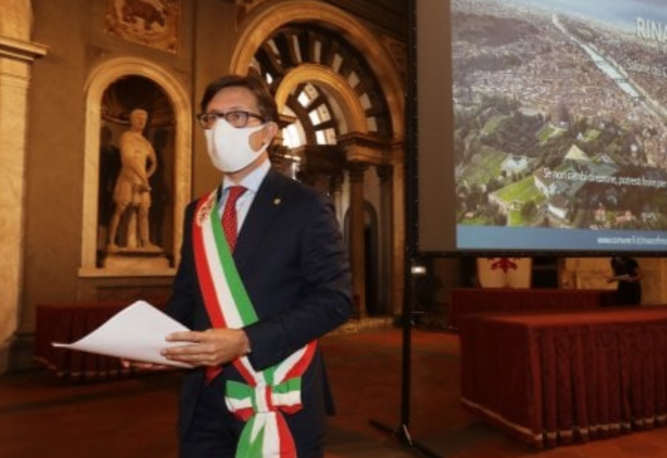Florence’s Mayor & #RinasceFirenze

As Florence and the rest of Italy enters a post-lockdown phase, the city’s mayor Dario Nardella delivered a speech in the Cinquecento hall in Palazzo Vecchio to request crowdfunding. He delivered a presentation about the #RinasceFirenze document available online here. The document, developed in collaboration with the public’s ideas and propositions, outlines a post-pandemic strategy for the city
Florence is perhaps one of the most loved cities in the world and has become a global capital of the arts. #RinasceFirenze hopes to promote a fundraising campaign at an international level in order to support the cultural, economic, educational and tourism sectors of the city.
Part of the reason why Florence is such an international city is due to tourism’s strong presence in the city’s economy. The coronavirus emergency, however, has devastated this sector and the mayor’s first plan of action is to alleviate this stress. Nardella explained that Florence’s future economy will not only center around tourism, but also include production and innovation so as to not only aid in the rebirth of the city, but also coincide with the sometimes more fleeting tourism sector. One problem the city will have to confront is the hospitality industry, with 49% of hotels remaining closed until September. A solution is to limit the number of short-term bookings while encouraging long-term stays in Airbnbs across the city.
In addition to this proposition, Nardella hopes to promote zero taxation zones in the city so as to encourage investments, economic growth and employment. These areas will function primarily as spaces for creativity, craftsmanship and culture––driving home Nardella’s aspirations to reshape Florence’s economy.
Prior to the pandemic there was discussion of creating a tramway stop in Piazza San Marco, but it will built at the end of Via Cavour. This way the stop will not disrupt the many pedestrians in the city’s center, but still be near the Duomo and Baptistery.
The plan not only outlines new transportation regulations and economic models, but also discusses how Florence can participate in large scale sporting events including the Tour de France and the 2032 Olympics. In collaboration with the Emilia Romagna region, Florence hopes to host Grand Départ, the initial segment of the Tour de France, which has never been hosted by Italy.
Mayor Nardella has also been in communication with the President of Emilia Romagna, Stefano Bonaccini, regarding how Tuscany and Emilia Romagna may join forces to host not only participate in the Tour de France, but also the 2032 Olympics. The latter is a difficult feat for any country, especially for a nation hit so hard by a pandemic. Nonetheless, both political leaders remain enthusiastic about how this collaboration could help stimulate Italy’s economy. For Nardella, hosting the Olympics is an obvious choice in the plan for the rebirth of Florence as he believes sporting events can aid in this economic and cultural renaissance.
These are the mayor’s ideas now, but there remains a space on the document’s website for citizens to leave their own ideas about the future of Florence. His response is similar to that of Florence-born director and producer Franco Zeffirelli who, when learning about the catastrophic flood of the Arno River in 1966 killing 101 people, rushed to Florence and began to capture the devastation in a film. The documentary brought international attention to the beloved city, prompting generous donations and ultimately raising $20 million. Similarly, Italian art critic Carlo Ludovico Ragghianti put forth an international call for artists to donate art to replace lost masterpieces in the flood. Both past instances of crowdfunding have inspired mayor Dario Nardella to call for a similar appeal in 2020.
Although both horrific moments in Florence’s history, a health emergency can not be equated to a flood and vice versa. While mayor Nardella alludes to artists who rose to the occasion and “crowd founded” to help their beloved city, 2020 welcomes a new wave (pardon the pun) of creativity, culture, and growth. Florence survived 1966, and the same will happen again with your help.
To read more in Italian, visit Florence’s La Repubblica news site. (elizabeth berry)
